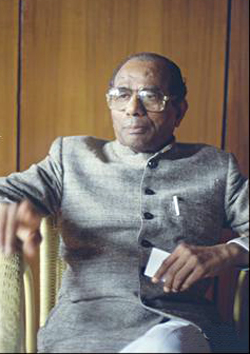Veerendra Patil, a veteran of several political battles, had once said that the aspiration of the Congress cadre was a double-edged sword: it could bring the party to power or it could mar the party’s prospects. “Yeh pagalpan hai (this is madness). This is the third location I have shifted to in the last five hours after being nearly assaulted by my own party men,” Patil had said. His comments had come at a time when the Janata Dal had committed harakiri in its second term in office (1985-88), just like the BJP has done in its very first term in Karnataka now, and Patil was seeing dreams of creating a record by returning to power as chief minister after a gap of 22 years. He may have been old fashioned, but his political brain was as sharp as it could be of a man at the helm of affairs. Yet, even he was rattled by the mood of the Congress cadre.
Today, there is no change in either the mood or the aspiration of the Congress cadre. Being on the sidelines since 2006 has made them hungry for power. More importantly, this is the first opportunity the party has got to remove the corrupt and inept BJP government. The anti-incumbency appears as blatant as it did in 1989 when Patil was trying to come to terms with what he had called the “new Congress party men” or the mood.
The unhappiness among the Congress workers as well as leaders is evident in practically every district across the state. If it is nomination of a not-so-active worker as its candidate in one constituency, it is nomination of a candidate whose caste group is in miniscule minority in another. In neighbouring constituencies, the issue is the fielding of a candidate belonging to just one backward community when the wise thing would have been to field a candidate of even a major community to get inter-constituency benefits.
If not all the above, a loyal party worker gets replaced because of the tantrums of the Kannada actor-turned-politician, Ambareesh. In the heartland of the Cauvery basin, dominated by the major caste group of Vokkaligas, the party decided to replace a candidate proposed by former chief minister and external affairs minister, SM Krishna, who does not seem to find favour with the high command anymore. Krishna’s candidate has now decided to contest as a rebel in not only Srirangapatna but also in Ambareesh’s constituency of Mandya.
This when there were signs of the Congress being able to ebb the influence of the Janata Dal (Secular) leader and former chief minister, HD Kumaraswamy, among his Vokkaliga base. In the other upper caste Lingayat-dominant region of Davanagere, the party gave in to the demand of Shamanur Shivashankarappa to field his son SS Mallikarjun, as well in the neighbouring constituency instead of giving it to a Muslim candidate. The original proposal, if implemented, would have prevented the JD(S) from cutting into the Muslim vote in the region.
There are many similar examples across the state. But, unlike the times of Patil when decision-making was a different process, the party set up a fairly democratic process this time. Names came in from the grassroots level. Guidelines were set as to who would be eligible. These covered age, margin of defeat in the last election below 15,000, no nomination for a candidate with criminal charges, no accommodation for those who enjoyed the benefits of the BJP rule as Independents, a strict no for children of ministers, so on and so forth.
And, these guidelines were touted around as those set by Rahul Gandhi, recently anointed as the vice-president of the party. But, when the final list came out in two and a half parts, it was clear that the young Gandhi was unable to beat the pressure built by the old hands in the party. The master politicians got their way in subverting every single guideline that the “game-changer” of the Congress could think of. Even his blue-eyed boys of the Youth Congress did not get their due.
The past says that there is nothing new in Congress men fighting among themselves particularly before elections. But the Congress does not have a Patil who consolidated his Lingayat community votes and the traditional vote bank of the backward classes, the dalits and the minorities. On the caste axis, the party is hoping for Siddaramaiah to consolidate the backward classes vote on the strength of his Kuruba (shepherd) community dominance. The dalits belonging to the Right Sect have been given due representation (courtesy union labour minister Mallikarjuna Kharge and KPCC chief G Parameshwara) but the party has just left the Left sect for BS Yeddyurappa’s Karnataka Janata Paksha (KJP) and the BJP to consolidate further its strategic 2008 investment.
The lack of a strategy in the selection of candidates that Yeddyurappa and Kumaraswamy excel in has made the Congress men, both the happy and unhappy ones, fret. No one doubts Yeddyurappa’s capacity to damage the BJP’s prospects across the state, particularly in Lingayat-dominant north Karnataka, with the exception of the coastal belt where the Congress appears upbeat. The moderate Hindu appears disturbed by the efforts of the Hindutva brigade to make it a laboratory to divide society. Even BJP leaders, privately, concede changing this mood is a challenge.
Unlike the Congress, the BJP appears a leaner outfit but the load of misdeeds weigh heavily on its shoulders. If it had a remote chance of its “give us one more chance” campaign succeeding, the BJP would make it Narendra Modi’s first victory after his elevation from Gujarat to the national level. (Modi is currently scheduled to address only a couple of meetings.) Its roots have become stronger even in parts of the Vokkaliga-dominated Old Mysore region where the JD(S) is the principal challenger to the Congress. If the JD(S) can gain some seats in north Karnataka with Kumaraswamy’s strategic planning, it could cut the Congress to size.
All this is in the realm of an ‘if’ as the campaign has just begun. But, the worry of some Congress men is that the party does not have a strategy for the campaign as well. In 1999, Krishna led the campaign by carrying all the leaders of the faction-ridden party in a bus to show that the Congress was a united force compared to the divided Janata Dal of Hegde and Deve Gowda. The party won a comfortable majority. Today, it is not even making such an effort. So, what will make the Congress go past the magic figure of 112 in an assembly of 224 to avoid a coalition?
As Patil privately conceded then: “Look, if the anti-incumbency is very high, it will outweigh all those who are unhappy in our party.” He led the party to its biggest ever victory in 1989. His statement is as valid today as it was then. Anti-incumbency is not yet discernible as a wave but a 12-day campaign period is a long time in deciding the fortunes of a political party and, in the current situation, the future of Karnataka’s development. Governance has never been the hallmark of a coalition except during 1983-85 when the practitioner was Ramakrishna Hegde.

